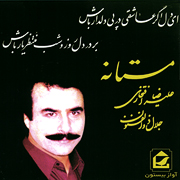
مستانه
Mastaneh
علیرضا افتخاری
Ali Reza Eftekhari
Whenever I heard this played on www.radiodarvish.com, in 2008, I would stop whatever I was doing so I could just marvel at the wondrously poignant expression in Eftekhari’s voice…especially on track 4. Upon finally hunting down a copy (thanks to Music Box L.A.) I found all tracklist on the CD sleeve was in Arabic, which thwarted my hopes of learning what that song in particular was about (the cover, however, appears to be in Farsi). All I know from online sniffing-about is that “Mastaneh” means “drunk” and that the general tone of these songs is one of passionate longing.
That so-compelling-to-me starts from an almost mantra-like murmur of the lyric before things get up to speed; the cyclical return to the song’s “zendeh shodam” phrase is what mesmerizes and which underpins the ecstasies which punctuate the song’s topography.
In early 2018, I received a delightful email from a gentleman who provided this wonderfully helpful and informative insight as to that standout track:
This is a famous poem of Mowlana (Rumi) when he describes meeting Shams-e Tabriz.
Mordeh boodam, zende shodamgerye boodam, khandeh shodam
(I was dead, I came to life, I was crying, I turned to laughter)So the part that you intuitively felt underpins the song is “I came to life” which is the moment that Rumi describes becoming awakened (the Sufi concept somewhat analogous to “enlightenment”). If you had to pick ONE moment in the entire Sufi experience, this is it. Also one of THE lines of Persian poetry everyone would know (maybe like Shakespeare’s “To be, or not to be”).
And THAT is why I continue to have this website online. Joy and knowledge are expressed and shared, and my life is enriched by such excellent interactions.
Comments © 2008 Mark Ellis Walker, except as noted, and no claim is made to the images and quoted lyrics.